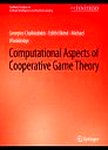版权所有:内蒙古大学图书馆 技术提供:维普资讯• 智图
内蒙古自治区呼和浩特市赛罕区大学西街235号 邮编: 010021

丛 书 名:Synthesis Lectures on Artificial Intelligence and Machine Learning
版本说明:1
I S B N:(纸本) 9783031004308
出 版 社:Springer Cham
出 版 年:1000年
页 数:XVI, 150页
主 题 词:Artificial Intelligence Machine Learning Mathematical Models of Cognitive Processes and Neural Networks
摘 要:Cooperative game theory is a branch of (micro-)economics that studies the behavior of self-interested agents in strategic settings where binding agreements among agents are possible. Our aim in this book is to present a survey of work on the computational aspects of cooperative game theory. We begin by formally defining transferable utility games in characteristic function form, and introducing key solution concepts such as the core and the Shapley value. We then discuss two major issues that arise when considering such games from a computational perspective: identifying compact representations for games, and the closely related problem of efficiently computing solution concepts for games. We survey several formalisms for cooperative games that have been proposed in the literature, including, for example, cooperative games defined on networks, as well as general compact representation schemes such as MC-nets and skill games. As a detailed case study, we consider weighted voting games:a widely-used and practically important class of cooperative games that inherently have a natural compact representation. We investigate the complexity of solution concepts for such games, and generalizations of them. We briefly discuss games with non-transferable utility and partition function games. We then overview algorithms for identifying welfare-maximizing coalition structures and methods used by rational agents to form coalitions (even under uncertainty), including bargaining algorithms. We conclude by considering some developing topics, applications, and future research directions.